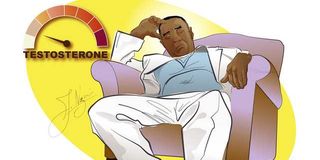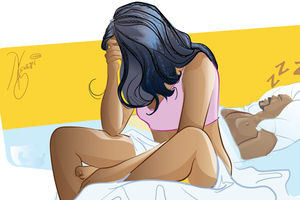
James was referred to the Sexology Clinic by his psychiatrist. He had been seeing the psychiatrist after being diagnosed with depression for three years. During the three years he had not been intimate with his wife, Grace, who was threatening to divorce him.
“Grace is not empathetic at all,” he lamented. “At this point in my life, when I am this low, she is adding insult to injury by threatening to abandon me.”
“I understand your condition and that is why I want to leave,” Grace fired back. “When I keep asking for sex and you can’t provide it your condition gets worse, your depression becomes severe, allow me to leave and get my needs fulfilled elsewhere. I do not want to be unfaithful by seeking satisfaction elsewhere and remaining in the marriage.”
The couple was in their late 30s and had two children. They had been married for 12 years. Sex was satisfactory in the first nine years of their marriage then James slowly slid into depression while having dwindling erections.
“It started with erections disappearing in the middle of the act,” he said. “With time I could not get an erection at all, and I lost desire for sex.”
The psychiatrist attributed James’ sexual difficulties to depression. Further, medicines used to treat depression sometimes interfere with sexual function. He told James that treating the depression was more important at this point than the sexual function and that he would be able to resume sex after his depression was stabilised.
With the threat of a divorce becoming imminent, the psychiatrist sent James over to the Sexology Clinic to see if anything could be done urgently to restore his sexual function.
I examined James. He was obese with reduced muscle mass. He reported that his weight gain had also been progressive in the recent years. He had scanty armpit and pubic hair.
His social and professional life had plummeted. He was a businessman importing and selling vehicles which required him to make several calls to Japan, travel to the coast to receive deliveries and attend to his customers’ questions. He however lacked this drive. The business was at the verge of collapsing. He preferred to sit in the house than do the aggressive socialising and marketing which was needed for the business.
“I feel tired all the time, I just want to rest,” he said.
“You seem to have chronic fatigue,” I replied, patching things up in my head to concretise a diagnosis.
I ordered for several tests and the main laboratory findings were that James had low blood levels and low testosterone.
“It all adds up now,” I said. “Your original problem is low testosterone leading to all the symptoms you have had including the low blood levels.”
For one, low testosterone depresses the mood, and most affected men can present to the psychiatrist with symptoms of depression. Low testosterone also leads to falling off of armpit and pubic hair.
On the muscular system, low testosterone leads to thinning of muscles accompanied by accumulation of fat. Obesity is common.
The effects of low testosterone on sexual function are most obvious. Erection problems become common and consistent. There may be progressive weakening of erections or erections waning in the course of the act, or difficulty to achieve an erection at all to initiate penetrative sex.
Desire for sex drops drastically in cases of low testosterone. Most men get anxious when their sex partners make suggestive moves. They feel scared of sex and may revert to behaviours that keep them off the sex situation including getting into alcohol, working late in the night to avoid being in bed, and opting for long distance relationships.
“Well, you now have a diagnosis, so how do we proceed?” James asked, breaking my monologue.
Treatment of low testosterone depend on the causes. For a man to have adequate testosterone, the factory where production happens must be in a good working condition. The factory, in this case, is the testis. The factory is however controlled by the brain through chemicals that mediate the communication between the testes and the part of the brain called the pituitary and the hypothalamus. Sometimes there is a breakdown in this complex communication channel resulting in a dysfunctional production of testosterone. I ordered for further tests to determine the cause of James’ low testosterone.
At the end of all the investigations, it was clear that James had severe blood flow defects in his testes. Blood was accumulating there in pockets known medically as varicoceles.
“The treatment for these is simple surgery to rescue your testes from drowning in the accumulated blood,” I explained.
It took six months, after surgery and stimulating James’ testes back to function, for James to regain his normal levels of testosterone. His depression improved with time and drugs for this were withdrawn. I did couple therapy for James and the wife to recreate the lost emotional connection and intimacy.
It was yet another testimony to the fact that every man suffering depression must have a testosterone test before being subjected to anti-depressants. Psychiatrists and mental health practitioners must always be conscious of this.






